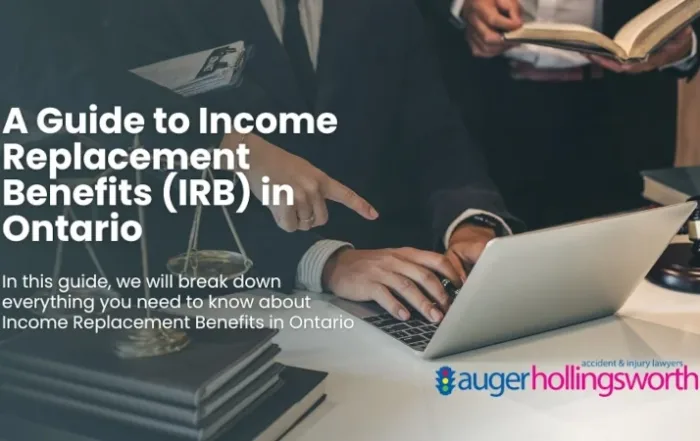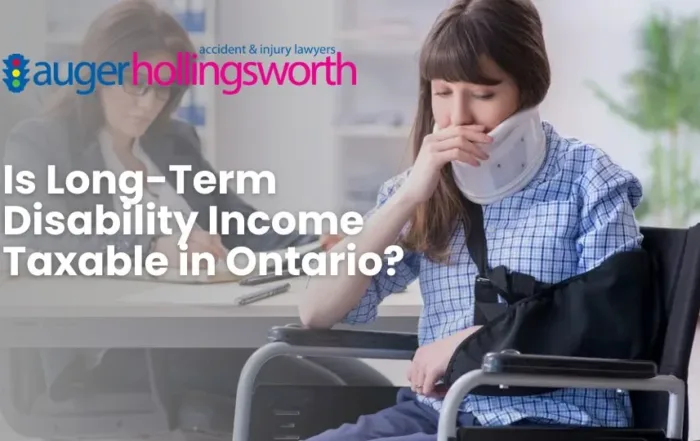Is there a Difference between Short Term and Long Term Disability?

After a disabling injury or a serious illness, many clients find it hard to fulfill their job responsibilities. In that situation disability benefits provide income replacement and peace of mind while you pursue your recovery.
Many Ontario employers offer group disability insurance plans. But very few employees actually read through their disability policy or understand the nuances of what those policies provide. The only time most employees think about their disability policies is when they have in fact become disabled.
In this article, we will cover:
What is a Disability?
The general definition of a disability is any condition of the body or mind that makes it difficult for the individual to perform certain activities or interact with the world at large. When it comes to a short term or long term disability, the definition changes slightly to any type of illness or injury that prevents the individual from performing the duties of their regular occupation.
Some disability policies aren’t specific to your occupation and instead require you to be disabled and unable to perform any occupation, so it’s best to know what your insurance policy’s verbiage is, so you know what you can claim after an injury. And if your claim was denied, it’s essential to speak to a disability attorney to learn how you can file an appeal.
What is Long-Term Disability?
A long-term disability is a condition that prevents someone from working or living to their usual standards for an extended period of time. Generally that will but 24 months or more. If your injury or illness will cause inability to work for 24 months or more – or is expected to do so – you can claim long-term disability benefits.
Most long-term disability plans will replace 60-70% of your normal income. Some plans will support you for up to two years that you can’t perform your own occupation, and after two years if you can’t perform any occupation, the plan will continue to provide for you as long as you remain disabled.
What qualifies a long term disability?
Before you can claim long-term disability, you’ll need to exhaust:
- All your sick-leave from your employer.
- EI sickness benefits.
- Short-term disability benefits.
After a certain period that will be specified in the disability policy (contract), if you still cannot work you will apply for long-term disability.
Often, there will be an initial entitlement for up to 24 months when you were unable to do the specific job that you had at the time you were injured or became ill. In your policy this might be referred to as “own occupation” coverage. This is where the insurance covers you for your own job. Many policies change the test for disability after 24 months on long-term disability benefits. The definition will change from your own occupation to “any occupation”.
After the 24 months, the employee will have to prove that they cannot do any occupation for which they are otherwise suited. Every policy is unique and looking at the exact definition of disability in your specific policy will be important.
What is Short Term Disability?
A short-term disability is defined as an injury or illness that prevents you from fulfilling the role of your occupation, but that isn’t expected to last years. Short term disability insurance helps to replace 60-85% of your income in the event that you can’t work due to an injury or illness.
In Canada, disability insurance is voluntary, and many employers offer it. You can also opt into it through health or life insurance agencies.
When will you use short term disability?
If you are hurt or sick, you will usually start by using up your sick days. Maybe your employer provides only the sick days under the Employment Standards Act. Maybe your employer provides a certain amount of paid sick leave above that Act. In either situation, once those paid sick days are gone you will look to see what your options are if you can’t return to work. If your company offers short term disability, or if you have purchased a disability policy yourself, you will look to your short-term disability benefits to cover your income.
Different policies provide for a different duration for short term disability and a different percentage of the person’s salary. It is not uncommon to see a percentage ranging from 65% of a salary to 75%. Occasionally you will see a policy with a percentage that is higher or lower.
Some employers do not offer short term disability insurance. Instead, employees will rely on Canada’s Employment Insurance for 15 weeks of EI medical benefits.
What are the differences between long term and short term disability?
The main difference is that short-term benefits are usually for an illness or injury that isn’t expected to last a long time, whereas long-term disability insurance is for people who may take years to recover, or may never recover at all. It’s important to know what your insurance policy covers, so that in the event of an injury you know what to claim.
What happens if my disability claim is denied?
If you are denied either short- or long-term disability under a group policy or an individual policy, you should consider contacting a long term disability lawyer. If your medical situation continues beyond the time when you can self-fund, and you do not get legal advice, you may find yourself in a difficult situation where you have no recourse. Speak to an experienced personal injury attorney today to learn about your options.
Other Sources of Disability Benefits
As we mentioned above, you may have disability benefits through your employer, through your health insurance, or through life insurance. If you don’t have disability insurance through any of those sources, you may still be able to collect it through either the Canada Pension Plan or the Quebec Pension Plan. Disability benefits from those plans are available to people who have contributed to them, and who can’t work regularly at any job because of a disability.
How can a lawyer help?
Once an insurance company decides to deny short term or long term benefits, it will be difficult to change their minds without a lawyer’s help. Insurance policies are complex. Plus, you are injured or suffering from an illness and your energy will be better spent focused on recovery.
A personal injury lawyer who has a focus on long-term disability or short-term disability can ease your burden significantly. We can help you understand your policy and your rights under that policy. If you have been denied benefits, we can help you make a strong claim and increase your chances of getting approved. So reach out to us and schedule your free consultation today, and remember that we don’t get paid until we get you a settlement or judgement.














